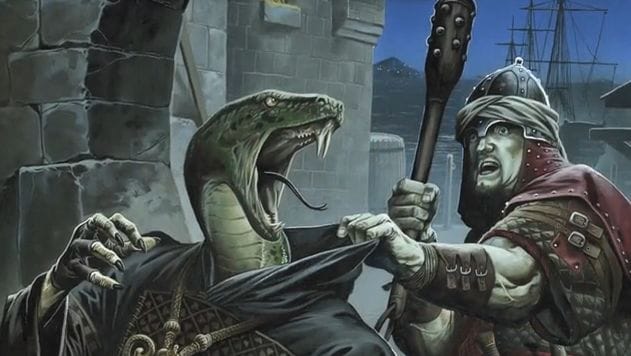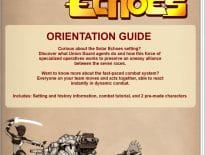
Chris Pramas is the President of Green Ronin Publishing and veteran of the roleplaying industry. He’s worked for Wizards of the Coast, signed deals with George R. R. Martin and is currently mid-Kickstarter with Freeport: The City of Adventure for the Pathfinder RPG.
In this interview we’re reminded that Green Ronin had a whirlwind of a start but we also get some peaks at a possible future. A future that may involve miniatures and a return to the Blue Rose RPG.
Freeport was one of the first Green Ronin products. How has the company grown and changed in the time between the original Freeport adventures and new Freeport we might get if the Kickstarter is successful?
Man, so much has changed. When I started Green Ronin in 2000, I was working at Wizards of the Coast and it was a side project. There was no staff at all, just Nicole Lindroos and I doing things in our spare time. Then Death in Freeport, one of only two modules released at GenCon 2000 when Dungeons & Dragons Third Edition debuted, sold like crazy and we were off the races. We lived through the boom and bust of the d20 era. We survived our fulfilment house Osseum stealing over $100,000 of incoming sales money from us. We were a design studio for Games Workshop and brought back Warhammer Fantasy Roleplay from the grave. We went on to secure some great licenses, like Game of Thrones, DC Comics, and Dragon Age. It’s been an eventful 13 years!
Nowadays we have 12 people on staff, some full time and some part time. We recently hired an Art Director, an Events Manager, and a new Dragon Age developer. Quite a difference from where we started.
How do you think the RPG industry has changed in that time?
First there was a big expansion with the d20 boom. Tons of new companies started up and huge numbers of books came out. That couldn’t be sustained, of course, so there was a crash and that knocked a lot of folks out. Since the turn of the millennium though, publishing technology has improved and improved. So now there are probably more small companies than ever before, since it’s easy to sell electronic books and Print on Demand’s quality has increased massively. Now there aren’t as many companies selling RPGs through distribution and retail stores, but there’s a much larger network of companies selling online.
What do you think the next three years will look like for roleplayers?
I am hopeful that we are at the beginning of a RPG renaissance. Next year is the 40th anniversary of Dungeons & Dragons, and also the release date for its latest edition. We’ve also seen the rise of nerd culture in mainstream movie and TV shows, as well as stuff like Felicia Day’s Geek & Sundry channel. If things go well, we will hopefully see the importance of RPGs as a category increase and welcome in a bunch of new players.
I watched you GM for Wil Wheaton in Geek & Sundry. How nervous were you? Did you have to conjure up any GM tricks to make it through the session?
I was indeed nervous. I’ve been GMing for over 30 years, but I’d never done it on camera before. The night before the shoot, I got maybe 2 hours of sleep. The game went well though and leading into the climax I was relaxed and energetic. Then they called the dinner break, and it was two hours before we started up again. My adrenalin wore off and I got really tired. Since we were going right into the climax, I had to jump start myself for the final encounter. That was hard, but I think it came out OK.

Interested in Freeport for Pathfinder? Check out the Kickstarter.
Freeport’s been described as a blend of fantasy action, pirate tale with Lovecraftian horror tucked away for good measure. What would your top three tips for GMs attempting to create and run a scenario in such a setting be?
First, understand that a city setting runs differently than a dungeon crawl. You have to be ready to improvise, as the PCs have easy access to many locations, resources, and NPCs. You’re likely to make up a bunch of stuff to keep up with them and that’s fine. Just make sure to write it down after each session! Then you can flesh things out and incorporate them further into the campaign.
Second, don’t overuse the threat of Freeport’s destruction. That’s been done in several adventures already, and yet people keep pitching me similar adventures. There is plenty to do in Freeport without going immediately to the existential threat!
Third, try to vary the types of adventures you run. Some Freeport adventures are Call of Cthulhu style investigations, but they shouldn’t all be. Swashbuckling nautical adventures and cloak and dagger adventures can work equally well. Dungeons too, either under Freeport or on nearby islands and such.
Is system important for a setting like Freeport? Will gamers see a difference between the d20 version and the Pathfinder version? Why do you think that’s the case?
Freeport was original built as a D&D setting, so it has a lot of that game’s assumptions baked in. There are elves, dwarves, and halflings, for example, and arcane and divine magic. However, it is still quite adaptable, as I think we’ve shown with the many Freeport Companions we’ve published since 2007. Each one of those provided mechanical support for a different game system to complement The Pirate’s Guide to Freeport (which has no game specific info in it). We’ve done Companions for d20, True20, Castles & Crusades, Pathfinder, and Savage Worlds. It got similar treatment in the Mutants & Masterminds fantasy genre book, Warriors & Warlocks. This year we are doing a FATE Freeport Companion, which was a stretch goal for the FATE Core Kickstarter by Evil Hat.
There will certainly be differences between the d20 rules and the Pathfinder rules and the reason is simple: Pathfinder has been evolving since its release. The game has options that either didn’t exist or weren’t core in the d20 days, so of course we want to take advantage of them. We also want people who bought the Pathfinder Freeport Companion (which we published several years ago) to understand that we’re not just cutting and pasting that material into the new book. We’ll be going over everything and revising it in accordance with where Pathfinder is at now. There will be a bunch of new material as well.
Green Ronin has some impressive licenses; Dragon Age and Game of Thrones, for example. When you’re pitching to manage those rights do spend a lot of time presenting system ideas or do the owners simply care about your business abilities?
Their concern is fidelity to the property. Most licensors, even gamers like George R.R. Martin, leave the mechanics to us. They figure that’s our area of expertise.
If there’s a significant divergence of plots between the TV Game of Thrones series and the books which would the RPG series follow?
The books. That’s the license we have, directly from GRRM. HBO has a separate deal with him and we’d need to get a second license from them to use their material.
You’re known to be a fan of the Pendragon RPG. What is it about the game that works well for you? Why haven’t other RPGs managed to build on this and make improvements?
I think Pendragon is one of the most epic achievements in roleplaying. There’s so much great stuff in there. The passions really capture the feel of Malory and the French romances. The notion that you can play a descendants of your original character down through the decade as Arthur’s story unfolds is also brilliant. And then the research and writing Greg Stafford did for the Great Pendragon Campaign is just unbelievable. That book lays out an 80 year chronology of the age, with adventure hooks throughout so the GM can build a massive campaign. If you have a committed group, there are few other games that will give you a campaign as rich.
As for why other games haven’t exactly followed its lead, it goes back to my remark “if you have a committed group.” You really need the right group for Pendragon and that’s why I’ve never played or run it as much as I’d like. That said, you can certainly see echoes of Pendragon in our Song of Ice and Fire RPG (in the noble house building system in particular).
What hints can you give us about future projects from Green Ronin? What ideas are you toying with even if you’re not yet committed?
Our big project for this year is the next game using the AGE system. The Adventure Game Engine is my rules design that powers the Dragon Age RPG. Since its first release, folks have been asking us for a non-licensed RPG using the rules and that’s what we’re working on. It’s a fantasy RPG with a brand new setting that we’re really excited about. Look for it in 2014.
As for other stuff, one of the secondary purposes of the current Freeport Kickstarter is to gauge the level of interest amongst Pathfinder fans for our stuff. We’ve talked about updating some of our most popular d20 titles, like Book of Fiends and the Advanced Bestiary. If Freeport funds, those projects become much more likely.
In the future I’d also like to do a scifi AGE game and return to Blue Rose (our Romantic Fantasy RPG). One of these days I want to do a minis game as well. I love miniatures, play minis games regularly, and would like to do more in the field than Dungeons & Dragons: Chainmail (whose tortured history is a story for another time)!
Thanks for the interview!
Take part in the conversations on the site and leave a comment below.

